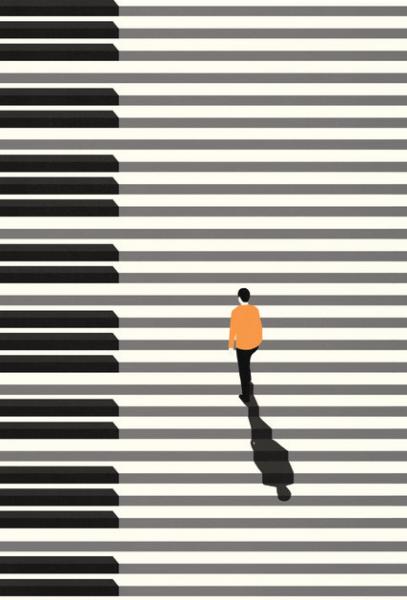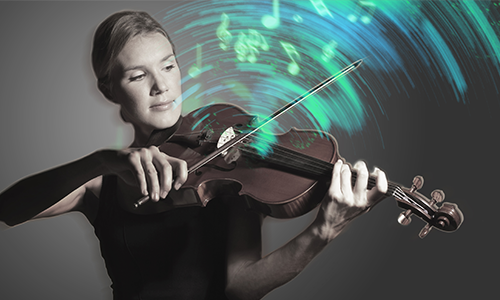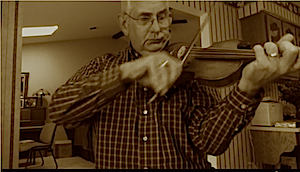6 Tips From Musicians On How To Rock At Life
 Across many different industries, from the political stage to the financial realm, many of the most successful leaders have been musicians. This intriguing statistic has led the New York Times to ask: Is Music the Key to Success?
Across many different industries, from the political stage to the financial realm, many of the most successful leaders have been musicians. This intriguing statistic has led the New York Times to ask: Is Music the Key to Success?
In this article by the Times, they suggest a definite link between music study and academic achievement. It presents excellent examples of high-achievers such as Condoleezza Rice who studied piano. It mentions Alan Greenspan, former chairperson of the Federal Reserve, and that he studied the clarinet. It tells of Paul Allen, the billionaire co-founder of Microsoft who studied guitar and about comedic legend Woody Allen who plays jazz clarinet.
How Music Lessons Affect Your Brain

Whether you are looking to broaden your musical knowledge or develop a skill you never have before, the benefits of learning how to play an instrument are more than you can imagine. Through music lessons people find ways to reduce stress, focus their energy on something productive and live a happier life with the opportunity of constantly improving themselves.
If you still don’t believe that learning a new instrument can benefit your life, here are 5 proven facts about about the how learning music can affect your brain.
Keeping your Brain Young
Learning how to play an instrument stimulates the brain in a way that no other task does. Even though we don’t realize it, when we listen to music we exercise our brain as it tries to identify patterns and beats. As an otolaryngologist at John Hopkins explains, “If you want to keep your brain engaged throughout the aging process, listening to or playing music is a great tool. It provides a total brain workout.”
Encouraging Brain Growth
Learning an Instrument at an Older Age - Student Blog

Learning an Instrument at an Older Age
When you get to be older like me, you get used to certain things becoming more difficult, while other things become easier. Recently I was talking to a good friend from college who also plays music. He told me that as he has gotten older, he can learn quicker now than when he was younger. I began to think about this and have some observations about why this might be.
Older folks have gotten used to the "busyness" of life. Thusly they understand the importance of making maximum use of their time. This can be related to learning an instrument, and I myself have applied it. This is one reason for taking lessons and a major reason for choosing ArtistWorks. It's been beneficial for me to choose when I view lessons and when I submit videos for review. I have experienced "self taught learning”, and it takes me a long time to advance. Lessons are the better way to go.
 When you get to be older like me, you get used to certain things becoming more difficult, while other things become easier. Recently I was talking to a good friend from college who also plays music. He told me that as he has gotten older, he can learn quicker now than when he was younger. I began to think about this and have some observations about why this might be.
When you get to be older like me, you get used to certain things becoming more difficult, while other things become easier. Recently I was talking to a good friend from college who also plays music. He told me that as he has gotten older, he can learn quicker now than when he was younger. I began to think about this and have some observations about why this might be.
Older folks have gotten used to the "busyness" of life. Thusly they understand the importance of making maximum use of their time. This can be related to learning an instrument, and I myself have applied it. This is one reason for taking lessons and a major reason for choosing ArtistWorks. It's been beneficial for me to choose when I view lessons and when I submit videos for review. I have experienced "self taught learning”, and it takes me a long time to advance. Lessons are the better way to go.
How Playing An Instrument Benefits Your Brain
As neuroscience has determined through decades of research, multiple areas light up in the brain when we to listen to music. In a split second we are able to process the sound, determine melody and rhythm, and put it back together into a unified musical experience.
So what happens in the brain when you go from active listener to active participate? By studying the brain in real time, technology such as FMRI and PET scanners have determined what goes on inside the brain when we're playing an instrument. Scientists have found that while listening to music uses multiple areas of the brain, playing music is the equivalent to a full body workout.
This is great news for all advocates of music education, and provides an interesting perspective to anyone actively learning an instrument. You’re not just getting better at playing music – you’re becoming a better human!






